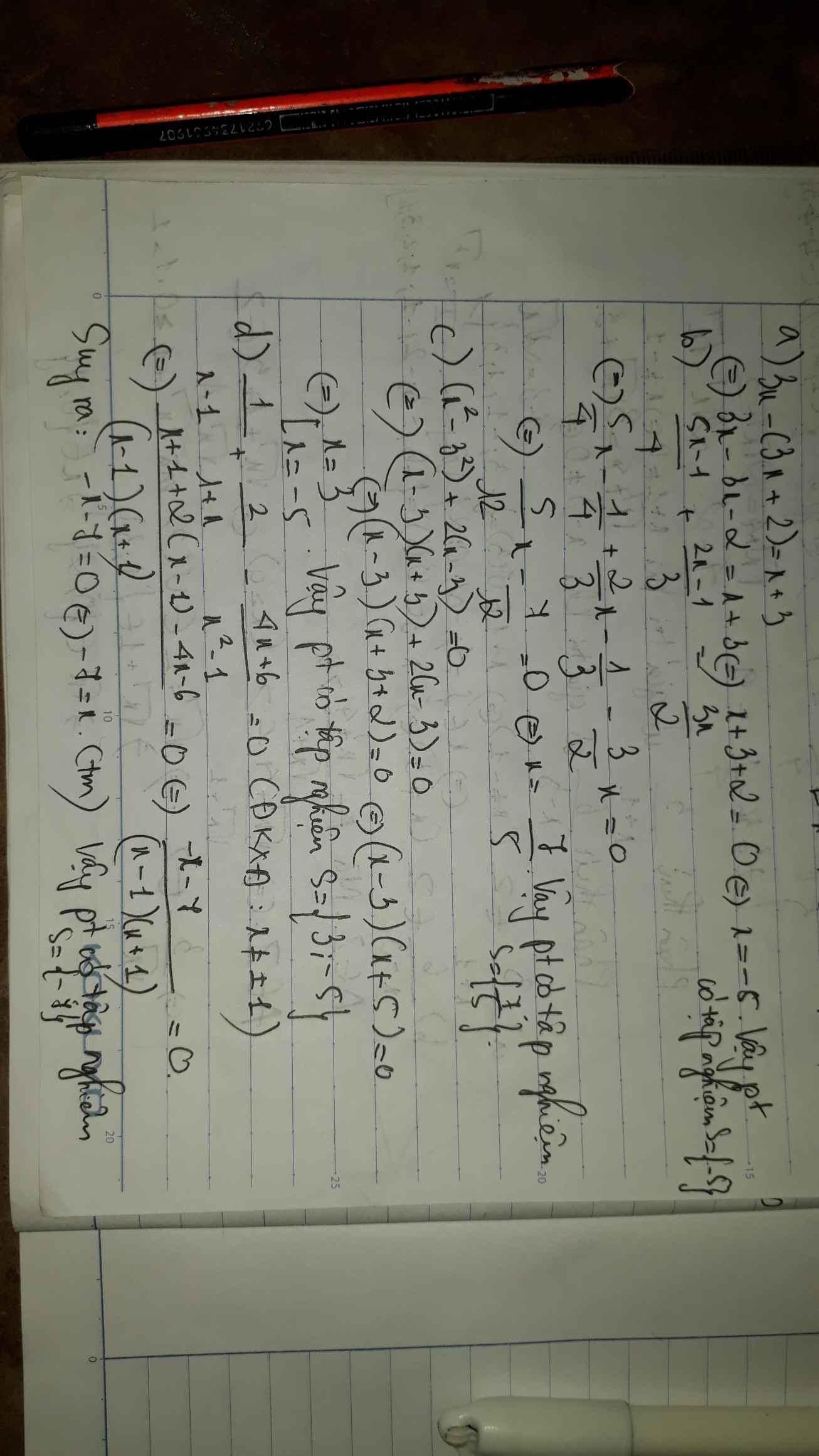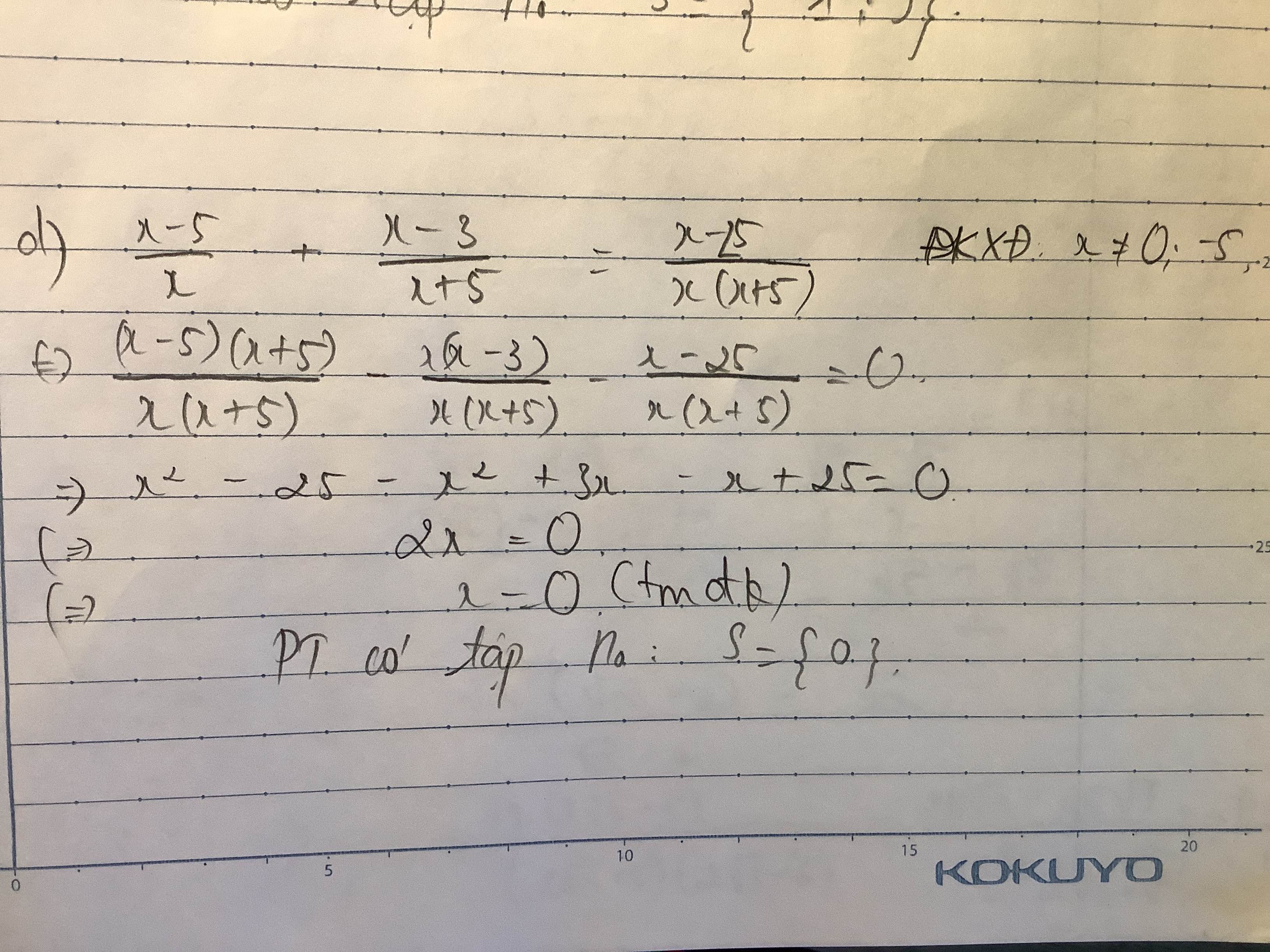Giải phương trình: \(x^3+\dfrac{x^3}{\left(x-1\right)^3}+\dfrac{3x^2}{x-1}-2=0\)

Những câu hỏi liên quan
giải các phương trình sau
a, 3x -(3x+2) =x+3
b, \(\dfrac{5x-1}{4}+\dfrac{2x-1}{3}=\dfrac{3x}{2}\)
c, \(\left(x^2-3^2\right)+2\left(x-3\right)=0\)
d,\(\dfrac{1}{x-1}+\dfrac{2}{1+x}-\dfrac{4x+6}{x^2-1}=0\)
a: Ta có: \(3x-\left(3x+2\right)=x+3\)
\(\Leftrightarrow x+3=-2\)
hay x=-5
b: Ta có: \(\dfrac{5x-1}{4}+\dfrac{2x-1}{3}=\dfrac{3x}{2}\)
\(\Leftrightarrow15x-3+8x-4=18x\)
\(\Leftrightarrow5x=7\)
hay \(x=\dfrac{7}{5}\)
Đúng 0
Bình luận (0)
Giải Phương trình
\(x-\dfrac{x+2}{3}< 3x+\dfrac{x}{2}+5
\)
\(\dfrac{x}{2}+\dfrac{1-x}{3}>0\)
\(\left(x-9\right)^2-x\left(x+9\right)< 0\)
a. \(x-\dfrac{x+2}{3}< 3x+\dfrac{x}{2}+5\)
\(\Leftrightarrow\dfrac{6x}{6}-\dfrac{2\left(x+2\right)}{6}< \dfrac{18x}{6}+\dfrac{3x}{6}+\dfrac{30}{6}\)
\(\Rightarrow6x-2x-4-18x-3x-30< 0\)
\(\Leftrightarrow-17x< 34\)
\(\Leftrightarrow x>-2\)
b. \(\dfrac{x}{2}+\dfrac{1-x}{3}>0\)
\(\Leftrightarrow3x+2-2x>0\)
\(\Leftrightarrow x>-2\)
c. \(\left(x-9\right)^2-x\left(x+9\right)< 0\)
\(\Leftrightarrow x^2-18x+81-x^2-9x< 0\)
\(\Leftrightarrow-27x< -81\)
\(\Leftrightarrow x>3\)
Đúng 2
Bình luận (0)
Giải phương trình: \(x^3+\dfrac{x^3}{\left(x-1\right)^3}+\dfrac{3x^2}{x-1}-2=0\).
ĐKXĐ: \(x\ne1\)
\(x^3+\left(\dfrac{x}{x-1}\right)^3+\dfrac{3x^2}{x-1}-2=0\)
\(\Leftrightarrow\left(x+\dfrac{x}{x-1}\right)^3-3x.\dfrac{x}{x-1}\left(x+\dfrac{x}{x-1}\right)+\dfrac{3x^2}{x-1}-2=0\)
\(\Leftrightarrow\left(\dfrac{x^2}{x-1}\right)^3-3\left(\dfrac{x^2}{x-1}\right)^2+\dfrac{3x^2}{x-1}-1=1\)
\(\Leftrightarrow\left(\dfrac{x^2}{x-1}-1\right)^3=1\)
\(\Leftrightarrow\dfrac{x^2}{x-1}-1=1\)
\(\Rightarrow x^2-2\left(x-1\right)=0\)
\(\Leftrightarrow\left(x-1\right)^2+1=0\)
Pt đã cho vô nghiệm
Đúng 3
Bình luận (1)
bài 1 giải các phương trình sau:h,left(dfrac{3}{4}x-1right)left(dfrac{5}{3}x+2right)0bài 2 giải các phương trình sau:b,3x-152x(x-5) m,(1-x)(5x+3)(3x-7)(x-1)d,x(x+6)-7x-420 p,left(2x-1right)^2-40f,x^3+2x^2-left(x-2right)0 r,left(2x-1right)^249h,(3x-1)(6x+1)(x+7)(3x-1) t,left(5x-3right)^2-left(4x-7right)^20j,left(2x-5right)^2-left(x+2right)^20 u,x^2-10x+160w,x...
Đọc tiếp
bài 1 giải các phương trình sau:
h,\(\left(\dfrac{3}{4}x-1\right)\left(\dfrac{5}{3}x+2\right)=0\)
bài 2 giải các phương trình sau:
b,3x-15=2x(x-5) m,(1-x)(5x+3)=(3x-7)(x-1)
d,x(x+6)-7x-42=0 p,\(\left(2x-1\right)^2-4=0\)
f,\(x^3+2x^2-\left(x-2\right)=0\) r,\(\left(2x-1\right)^2=49\)
h,(3x-1)(6x+1)=(x+7)(3x-1) t,\(\left(5x-3\right)^2-\left(4x-7\right)^2=0\)
j,\(\left(2x-5\right)^2-\left(x+2\right)^2=0\) u,\(x^2-10x+16=0\)
w,\(x^2-x-12=0\)
Bài `1:`
`h)(3/4x-1)(5/3x+2)=0`
`=>[(3/4x-1=0),(5/3x+2=0):}=>[(x=4/3),(x=-6/5):}`
______________
Bài `2:`
`b)3x-15=2x(x-5)`
`<=>3(x-5)-2x(x-5)=0`
`<=>(x-5)(3-2x)=0<=>[(x=5),(x=3/2):}`
`d)x(x+6)-7x-42=0`
`<=>x(x+6)-7(x+6)=0`
`<=>(x+6)(x-7)=0<=>[(x=-6),(x=7):}`
`f)x^3-2x^2-(x-2)=0`
`<=>x^2(x-2)-(x-2)=0`
`<=>(x-2)(x^2-1)=0<=>[(x=2),(x^2=1<=>x=+-2):}`
`h)(3x-1)(6x+1)=(x+7)(3x-1)`
`<=>18x^2+3x-6x-1=3x^2-x+21x-7`
`<=>15x^2-23x+6=0<=>15x^2-5x-18x+6=0`
`<=>(3x-1)(5x-1)=0<=>[(x=1/3),(x=1/5):}`
`j)(2x-5)^2-(x+2)^2=0`
`<=>(2x-5-x-2)(2x-5+x+2)=0`
`<=>(x-7)(3x-3)=0<=>[(x=7),(x=1):}`
`w)x^2-x-12=0`
`<=>x^2-4x+3x-12=0`
`<=>(x-4)(x+3)=0<=>[(x=4),(x=-3):}`
Đúng 1
Bình luận (0)
`m)(1-x)(5x+3)=(3x-7)(x-1)`
`<=>(1-x)(5x+3)+(1-x)(3x-7)=0`
`<=>(1-x)(5x+3+3x-7)=0`
`<=>(1-x)(8x-4)=0<=>[(x=1),(x=1/2):}`
`p)(2x-1)^2-4=0`
`<=>(2x-1-2)(2x-1+2)=0`
`<=>(2x-3)(2x+1)=0<=>[(x=3/2),(x=-1/2):}`
`r)(2x-1)^2=49`
`<=>(2x-1-7)(2x-1+7)=0`
`<=>(2x-8)(2x+6)=0<=>[(x=4),(x=-3):}`
`t)(5x-3)^2-(4x-7)^2=0`
`<=>(5x-3-4x+7)(5x-3+4x-7)=0`
`<=>(x+4)(9x-10)=0<=>[(x=-4),(x=10/9):}`
`u)x^2-10x+16=0`
`<=>x^2-8x-2x+16=0`
`<=>(x-2)(x-8)=0<=>[(x=2),(x=8):}`
Đúng 1
Bình luận (0)
Bài 1: Giải phương trình
\(a,\dfrac{x+1}{2009}+\dfrac{x+3}{2007}=\dfrac{x+5}{2005}+\dfrac{x+7}{1993}\)
\(b,\left(x+2\right)^4+\left(x+4\right)^4=14\)
\(c,\left(x-3\right)\left(x-2\right)x+1=60\)
d, \(2x^4+3x^3-x^2+3x+2=0\)
Với \(x=0\) không phải nghiệm
Với \(x\ne0\) chia 2 vế cho \(x^2\), pt tương đương:
\(2x^2+3x-1+\dfrac{3}{x}+\dfrac{2}{x^2}=0\)
\(\Leftrightarrow2\left(x+\dfrac{1}{x}\right)^2+3\left(x+\dfrac{1}{x}\right)-5=0\)
\(\Leftrightarrow\left[{}\begin{matrix}x+\dfrac{1}{x}=1\\x+\dfrac{1}{x}=-\dfrac{5}{2}\end{matrix}\right.\)
\(\Leftrightarrow\left[{}\begin{matrix}x^2-x+1=0\\2x^2+5x+2=0\end{matrix}\right.\)
\(\Leftrightarrow\left[{}\begin{matrix}\left(x-\dfrac{1}{2}\right)^2+\dfrac{3}{4}=0\left(vô-nghiệm\right)\\\left(x+2\right)\left(2x+1\right)=0\end{matrix}\right.\)
\(\Leftrightarrow\left[{}\begin{matrix}x=-2\\x=-\dfrac{1}{2}\end{matrix}\right.\)
Đúng 0
Bình luận (0)
Câu a chắc là đề sai, vì nghiệm vô cùng xấu, tử số của phân thức cuối cùng là \(x+17\) mới hợp lý
b.
Đặt \(x+3=t\)
\(\Rightarrow\left(t+1\right)^4+\left(t-1\right)^4=14\)
\(\Leftrightarrow t^4+6t^2-6=0\) (đến đây đoán rằng bạn tiếp tục ghi sai đề, nhưng thôi cứ giải tiếp)
\(\Rightarrow\left[{}\begin{matrix}t^2=-3+\sqrt{15}\\t^2=-3-\sqrt{15}\left(loại\right)\end{matrix}\right.\)
\(\Rightarrow t=\pm\sqrt{-3+\sqrt{15}}\Rightarrow x=-3\pm\sqrt{-3+\sqrt{15}}\)
Câu c chắc cũng sai đề, vì lên lớp 8 rồi không ai cho đề kiểu này cả, người ta sẽ rút gọn luôn số 1 bên trái và 60 bên phải.
Đúng 0
Bình luận (1)
c)Ta có: \(\left(x-3\right)\left(x-2\right)\left(x+1\right)=60\)
\(\Leftrightarrow\left(x^2-5x+6\right)\left(x+1\right)=60\)
\(\Leftrightarrow x^3+x^2-5x^2-5x+6x+6-60=0\)
\(\Leftrightarrow x^3-4x^2+x-54=0\)
Bạn xem lại đề, nghiệm rất xấu
Đúng 0
Bình luận (0)
Xem thêm câu trả lời
Giải các phương trình
1,\(3x-1=0\\\) 4, \(\dfrac{x}{3}-\dfrac{x}{5}=4\)
2, \(2-x=3x+1\) 5, \(\dfrac{x-1}{4}+\dfrac{2x+1}{6}=\dfrac{3}{2}\)
3, \(2\left(x-2\right)-1=5x\)
1,\(3x-1=0\Leftrightarrow3x=-1\Leftrightarrow x=-\dfrac{1}{3}\)
2,\(2-x=3x+1\Leftrightarrow2-1=3x+x\rightarrow1=4x\Rightarrow x=-\dfrac{1}{4}\)
Đúng 1
Bình luận (0)
3,\(2\left(x-2\right)-1=5x\Leftrightarrow2x-4-1=5x\Leftrightarrow2x-5x=4+1\Rightarrow3x=5\Rightarrow x=\dfrac{5}{3}\)
4,\(\dfrac{x}{3}-\dfrac{x}{5}=4\Leftrightarrow\dfrac{5x}{15}-\dfrac{3x}{15}=\dfrac{60}{15}\Rightarrow5x-3x=60\Rightarrow2x=60\Rightarrow x=\dfrac{60}{2}=30\)
Đúng 1
Bình luận (0)
5,\(\dfrac{x-1}{4}+\dfrac{2x+1}{6}=\dfrac{3}{2}\Leftrightarrow\dfrac{3\left(x-1\right)}{12}+\dfrac{2\left(2x+1\right)}{12}=\dfrac{18}{12}\)
\(3\left(x-1\right)+2\left(2x+1\right)=18\Leftrightarrow3x-3+4x+2=18\Leftrightarrow3x+4x=3-2+18\Rightarrow7x=19\Rightarrow x=\dfrac{19}{2}\)
Đúng 1
Bình luận (0)
Giải các bất phương trình sau:a) left(x^2+3x-4right)left(3-2xright) 0 dfrac{x^2+3x+4}{x^2-2}ge0 dfrac{xleft(x^2+4x+4right)}{x^2-1}ge0b) dfrac{3x-2}{2-x}le-xc) dfrac{x-3}{x+1}dfrac{x+4}{x+2}d) dfrac{x+2}{x-2}-dfrac{x+3}{x-2}1e) |2x-3|x+1f) |2x-5|le x+1g) x-4-|x^2+3x-4|0h) left|x^2+4x+3right|left|x^2-4x-5right|
Đọc tiếp
Giải các bất phương trình sau:
a) \(\left(x^2+3x-4\right)\left(3-2x\right)< 0\)
\(\dfrac{x^2+3x+4}{x^2-2}\ge0\)
\(\dfrac{x\left(x^2+4x+4\right)}{x^2-1}\ge0\)
b) \(\dfrac{3x-2}{2-x}\le-x\)
c) \(\dfrac{x-3}{x+1}>\dfrac{x+4}{x+2}\)
d) \(\dfrac{x+2}{x-2}-\dfrac{x+3}{x-2}>1\)
e) \(|2x-3|>x+1\)
f) \(|2x-5|\le x+1\)
g) \(x-4-|x^2+3x-4|>0\)
h) \(\left|x^2+4x+3\right|>\left|x^2-4x-5\right|\)
giải các phương trình sau
a, 4x- 2(1-x)= 5(x-4)
b, \(\dfrac{x}{6}+\dfrac{1-3x}{9}=\dfrac{-x+1}{12}\)
c, \(\left(x+2\right)^2-3\left(x+2\right)=0\)
d,\(\dfrac{x-5}{x}+\dfrac{x-3}{x+5}=\dfrac{x-25}{x\left(x+5\right)}\)
a: Ta có: \(4x-2\left(1-x\right)=5\left(x-4\right)\)
\(\Leftrightarrow4x-2+2x=5x-20\)
\(\Leftrightarrow x=-18\)
b: Ta có: \(\dfrac{x}{6}+\dfrac{1-3x}{9}=\dfrac{-x+1}{12}\)
\(\Leftrightarrow6x+4\left(1-3x\right)=3\left(-x+1\right)\)
\(\Leftrightarrow6x+4-12x=-3x+3\)
\(\Leftrightarrow-3x=-1\)
hay \(x=\dfrac{1}{3}\)
c: Ta có: \(\left(x+2\right)^2-3\left(x+2\right)=0\)
\(\Leftrightarrow\left(x+2\right)\left(x-1\right)=0\)
\(\Leftrightarrow\left[{}\begin{matrix}x=-2\\x=1\end{matrix}\right.\)
Đúng 0
Bình luận (0)
d: Ta có: \(\dfrac{x-5}{x}+\dfrac{x-3}{x+5}=\dfrac{x-25}{x\left(x+5\right)}\)
\(\Leftrightarrow x^2-25+x^2-3x=x-25\)
\(\Leftrightarrow2x^2-4x=0\)
\(\Leftrightarrow2x\left(x-2\right)=0\)
\(\Leftrightarrow\left[{}\begin{matrix}x=0\left(loại\right)\\x=2\left(nhận\right)\end{matrix}\right.\)
Đúng 0
Bình luận (0)
Giải các phương trình sau:
1. \(a,\dfrac{6}{x-1}-\dfrac{4}{x-3}=\dfrac{8}{2x-6}\)
\(b,\dfrac{1}{x-2}+\dfrac{5}{x+1}=\dfrac{3}{2-x}\)
\(c,\dfrac{3x}{x-2}-\dfrac{x}{x-5}=\dfrac{3x}{\left(x-2\right)\left(5-x\right)}\)
2. \(a,\left(x+2\right)\left(3-4x\right)=x^2+4x+4\)
\(b,2x^2-6x+1\)
1a.
ĐKXĐ: \(x\ne\left\{1;3\right\}\)
\(\Leftrightarrow\dfrac{6}{x-1}=\dfrac{4}{x-3}+\dfrac{4}{x-3}\)
\(\Leftrightarrow\dfrac{3}{x-1}=\dfrac{4}{x-3}\Leftrightarrow3\left(x-3\right)=4\left(x-1\right)\)
\(\Leftrightarrow3x-9=4x-4\Rightarrow x=-5\)
b.
ĐKXĐ: \(x\ne\left\{-1;2\right\}\)
\(\Leftrightarrow\dfrac{5}{x+1}=\dfrac{3}{2-x}+\dfrac{1}{2-x}\)
\(\Leftrightarrow\dfrac{5}{x+1}=\dfrac{4}{2-x}\Leftrightarrow5\left(2-x\right)=4\left(x+1\right)\)
\(\Leftrightarrow10-2x=4x+4\Leftrightarrow6x=6\Rightarrow x=1\)
Đúng 4
Bình luận (0)
1c.
ĐKXĐ: \(x\ne\left\{2;5\right\}\)
\(\Leftrightarrow\dfrac{3x\left(x-5\right)}{\left(x-2\right)\left(x-5\right)}-\dfrac{x\left(x-2\right)}{\left(x-2\right)\left(x-5\right)}=\dfrac{-3x}{\left(x-2\right)\left(x-5\right)}\)
\(\Leftrightarrow3x\left(x-5\right)-x\left(x-2\right)=-3x\)
\(\Leftrightarrow2x^2-10x=0\Leftrightarrow2x\left(x-5\right)=0\Rightarrow\left[{}\begin{matrix}x=0\\x=5\left(loại\right)\end{matrix}\right.\)
2a.
\(\Leftrightarrow-4x^2-5x+6=x^2+4x+4\)
\(\Leftrightarrow5x^2+9x-2=0\Rightarrow\left[{}\begin{matrix}x=-2\\x=\dfrac{1}{5}\end{matrix}\right.\)
2b.
\(2x^2-6x+1=0\Rightarrow x=\dfrac{3\pm\sqrt{7}}{2}\)
Đúng 4
Bình luận (0)
giải phương trình :
a, \(2x^2-11x+21-3\sqrt[3]{4x-4}=0\)
b, \(\left(3x-2\right)\sqrt{x+1}-x^2-x-2=0\)
c, \(x+4-2\left(\dfrac{x+2}{x-1}\right)\sqrt{\dfrac{x-1}{x+2}}=0\)
c.
ĐKXĐ: \(\left[{}\begin{matrix}x>1\\x< -2\end{matrix}\right.\)
\(\Leftrightarrow x+4-2\sqrt[]{\left(\dfrac{x+2}{x-1}\right)^2\left(\dfrac{x-1}{x+2}\right)}=0\)
\(\Leftrightarrow x+4-2\sqrt[]{\dfrac{x+2}{x-1}}=0\)
\(\Leftrightarrow x+4=2\sqrt[]{\dfrac{x+2}{x-1}}\) (\(x\ge-4\))
\(\Leftrightarrow x^2+8x+16=\dfrac{4\left(x+2\right)}{x-1}\)
\(\Rightarrow x^3+7x^2+4x-24=0\)
\(\Leftrightarrow\left(x+3\right)\left(x^2+4x-8\right)=0\)
\(\Leftrightarrow\left[{}\begin{matrix}x=-3\\x=-2+2\sqrt{3}\\x=-2-2\sqrt{3}\left(loại\right)\end{matrix}\right.\)
Đúng 2
Bình luận (0)
a.
\(\Leftrightarrow2x^2-11x+21=3\sqrt[3]{4\left(x-1\right)}\)
Do \(2x^2-11x+21=2\left(x-\dfrac{11}{4}\right)^2+\dfrac{47}{8}>0\Rightarrow3\sqrt[3]{4\left(x-1\right)}>0\Rightarrow x-1>0\)
Ta có:
\(VT=2x^2-11x+21-3\sqrt[3]{4x-4}=2\left(x^2-6x+9\right)+x+3-3\sqrt[3]{4\left(x-1\right)}\)
\(=2\left(x-3\right)^2+x+3-3\sqrt[3]{4\left(x-1\right)}\)
\(\Rightarrow VT\ge x+3-3\sqrt[3]{4\left(x-1\right)}=\left(x-1\right)+2+2-3\sqrt[3]{4\left(x-1\right)}\)
\(\Rightarrow VT\ge3\sqrt[3]{\left(x-1\right).2.2}-3\sqrt[3]{4\left(x-1\right)}=0\)
Đẳng thức xảy ra khi và chỉ khi:
\(\left\{{}\begin{matrix}\left(x-3\right)^2=0\\x-1=2\\\end{matrix}\right.\) \(\Leftrightarrow x=3\)
Vậy pt có nghiệm duy nhất \(x=3\)
Đúng 1
Bình luận (0)
b.
ĐKXD: \(x\ge-1\)
Phương trình: \(2\left(x+1\right)-\left(3x-2\right)\sqrt[]{x+1}+x^2-x=0\)
Đặt \(\sqrt[]{x+1}=t\ge0\)
\(\Rightarrow2t^2-\left(3x-2\right)t+x^2-x=0\)
\(\Delta=\left(3x-2\right)^2-8\left(x^2-x\right)=\left(x-2\right)^2\)
\(\Rightarrow\left[{}\begin{matrix}t=\dfrac{3x-2+x-2}{4}=x-1\\t=\dfrac{3x-2-x+2}{4}=\dfrac{x}{2}\end{matrix}\right.\)
\(\Leftrightarrow\left[{}\begin{matrix}\sqrt[]{x+1}=x-1\left(x\ge1\right)\\\sqrt[]{x+1}=\dfrac{x}{2}\left(x\ge0\right)\end{matrix}\right.\)
\(\Leftrightarrow\left[{}\begin{matrix}x+1=x^2-2x+1\left(x\ge1\right)\\x+1=\dfrac{x^2}{4}\left(x\ge0\right)\end{matrix}\right.\)
\(\Leftrightarrow\left[{}\begin{matrix}x=3\\x=2+2\sqrt[]{2}\end{matrix}\right.\)
Đúng 1
Bình luận (0)

























